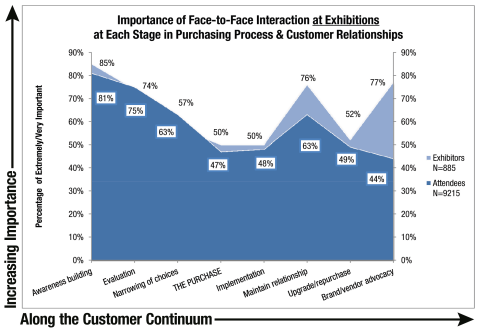CEIR's Latest Report Indicates Attendees Prefer Face-to-face Interaction with Exhibitors

The latest report in the Center for Exhibition Industry Research’s series, “The Role and Value of Face-to-Face Interaction”, indicated that attendees and exhibitors believe it is vital to meet in person on the showfloor.
CEIR surveyed 885 exhibitors and 9,215 attendees about the importance of the face-to-face process in general during each stage in the purchasing process and customer relationships.
Attendees placed high importance on face-to-face interactions at all pre-purchase stages, with two-thirds or more ranking these interactions important for investigating, evaluating and narrowing down choices before buying.
Post-purchase, 71 percent of attendees placed high importance on face-to-face interactions to maintain relationships with vendors.
Vendors also indicated that before the purchase they placed a high value on face-to-face interaction for awareness building, 82 percent, but a lower value, 59 percent, on meeting face-to-face to help buyers narrow their choices.
“Exhibitors may be missing an important opportunity to interact with attendees at a critical phase prior to making the actual purchase decision,” the report concluded.
Another aspect of the report asked respondents about the importance of face-to-faceat exhibitions (as opposed to in general) at each stage in the purchasing process and customer relationships.
The majority of attendees assigned high importance to face-to-face interaction in the pre-purchase phases.
Just under one-half assigned importance for all other phases, except for maintaining relationship, which was 63 percent.
The majority of exhibitors assigned high importance to engaging face-to-face with attendees at their exhibits at all phases of the customer continuum, with three-quarters or more placing importance on the first two pre-purchase phases - relationship maintenance and brand advocacy stages.
Again, some exhibitors may be missing the chance to influence attendee purchases at the ‘narrowing of choices’ phase; 63 percent of attendees assigned high importance to face-to-face interactions at exhibits for this purpose, compared with 57 percent of exhibitors, the report concluded.
Lastly, the survey asked attendees and exhibitors there preferred method of obtaining and providing information.
Fifty-six percent of attendees and 67 percent of exhibitors said their first choice of interaction was face-to-face conversation with exhibit personnel, with the second choice for both being one-on-one demonstrations with exhibit personnel.
“This study …affirms the enduring value of face-to-face interaction and the exhibition setting’s unique position of offering both attendees and exhibitors a cost- and time-effective way to accomplish these highly valued activities,” the report concluded. “Creating a system of quality interaction can create a unique buying/selling environment for those involved, where ROI is unbeatable. Even today, with the explosion of digital media options around us, the value of face-to-face marketing endures.”
According to Nancy Drapeau, CEIR’s director of research, there are three more reports on tap in this series:” Exhibition Staff Practice Summaries”, “Trends in Use of Exhibition” and “Profiles of Attendees and Exhibitions”.


Add new comment